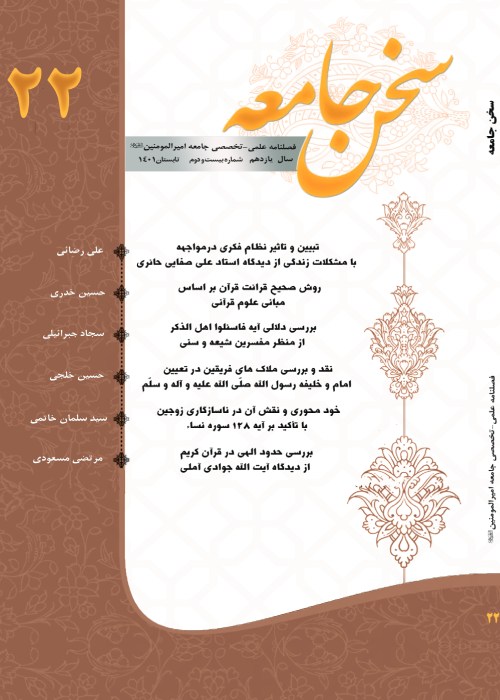فهرست مطالب
فصلنامه سخن جامعه
پیاپی 6 (پاییز 1394)
- تاریخ انتشار: 1395/02/15
- تعداد عناوین: 8
-
صفحه 4
- مقاله
-
صفحه 41
-
صفحه 73
-
Page 5Poverty is known and referred to as a harmful phenomenon and dilemma for the human kind in the outside religious viewpoint and in human science. All these theories are seeking a solution to get rid of this phenomenon. However, considering the religious texts, poverty has been divided in a more broadly sense which in some cases has been admired and praised. Besides sometimes religious leaders have been proud of the poor companionship. Now it is more essential to present the literal meanings of the word poverty more than its varieties and then after familiarizing the reader with its varieties, material and spiritual poverty, we will continue to present the effects of poverty and to sum up we will refer to the status of its different kinds and their effects in religious texts.Keywords: poverty, need, material poverty, spiritual poverty
-
Page 25Today as new questions are being raised, Islam is facing new disagreements and difference of opinions which are not beneficial for this religion by themselves. One of issues which has mainly been a matter of disagreement in Islam is related to the subject of pontificate. The writer of this article, considering this dissension as a matter of interest, is trying to analyze the Sadeqin verse which is related to the subject of pontificate. This issue, due to inter-religious nature, relies on Hadith and part of intellect. So, the method used to write this article is Islamic Scholastic Theology or Kalam. We pursue the subject of pontificate comparatively and based on two main sects of Islam, namely Shia and Sunni.Keywords: Pontificate, Sadeqin Verse, Hadiths about Sadeqin verse, Shia, Sunni
-
Page 41This essay is trying to answer this question that if the concept of Wilayat which has a great significance in traditions and is greatly highlighted in our literature and poetry is just to say that Ali (A.S) and his infallible children are the prophets successors or it is beyond any historical issue and it implies the truth that the words of Ahlul Bayt has the same authority of Gods word and the prophets word. Therefore, due to the authority of their deeds and words, one must take the pledge to obey them in practice and follow their way. So according to the verses and traditions, it is certain that Ahlul Bayts words have the authority for us and we must act as they said, however Wilayat and Muwalat imply a much higher truth.Keywords: Wilayat, Wilayat, e Faqih, verses, traditions
-
Page 59This article classifies the opinions of Supreme Leader about liberality movement using the method of qualitative analysis of content. Therefore, in first chapter the historical background of liberality is surveyed and then, based on the approach of Supreme Leader, the obstacles of liberality are divided in two distinct categories of internal and external. In the end, the solutions for improvement which previously mentioned by Supreme Leader. Since this article scrutinizes the opinion of Supreme Leader about liberality with a qualitative content analysis approach, only those titles are surveyed which have previously mentioned by Supreme Leader, because he is the main issuant and advocate of this discourse.Keywords: Supreme Leader, Liberality, obstacles of Liberality, Solutions for obstacles of Liberality
-
Page 73Logicians often consider the subject of every knowledge as a criterion to distinguish it from other sciences and believe that what distinguishes knowledge from other sciences is its subject. Nevertheless, some, by believing in lack of reason for the subject of the knowledge and challenging it, know the definition and the finality of the sciences as the reason of their distinction. Allameh Tabatabaee like other logicians believes in what distinguishes knowledge from other sciences is its subject and the subject of the knowledge is based on the inherent accident and he tries to defend this theory by reducing it. This essay is trying to study the late Allameh Tabatabaees views on this speech and what distinguishes his views with other logicians who know the finality of the sciences as their distinguishing aspect.Keywords: inherent accident, the subject of the knowledge, distinction of the sciences, Allameh Tabatabaee
-
Page 83According to the cause and effect law, every action is followed by a reaction. Good deeds will leave positive influences and consequently bad deeds will leave its negative influences. As good works will leave positive effects in human soul and spirit, bad works or sins from the religious viewpoint will ruin the human soul and spirit. Moreover, they will not only impress our worldly life but they will also have an impact on afterlife. This essay is trying to study the evil effects of sin on both lives of human being.Keywords: sin, worldly effects of sin, effects of sin in afterlife
-
Page 97Of all creatures, only human is seeking his own truth and fate. So, he pays a considerable attention to a meaningful life. Modern man seems anxious, depressed and lonely in terms of spirituality and mentality and resorts to different ways to be released from such status. Researching in fields of lifes meaning is one of these ways. Thinkers, including philosophers, psychologists and religious scholars have conducted numerous researches about the meaning of life and believe that an individual can make his/her lifer meaningful by observing some factors, namely love, work, duty, religiosity and etc. Due to its awareness of humans reality and his real life, Islam can provide the best meaning for life using Islamic sources like revelation and life Imams.Keywords: The meaning of life, nihilism, world view, component, meaningfulness


